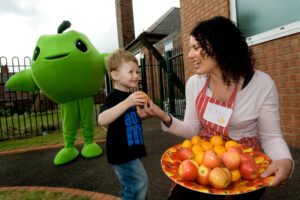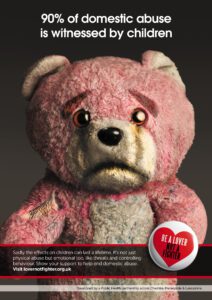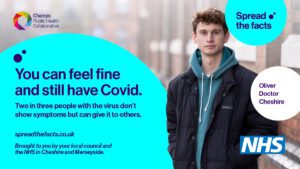 The Collaborative has a long history of producing innovative and award-winning campaigns to communicate important public health messages and help change behaviour. Here are some of the most popular campaigns we’ve delivered over the years.
The Collaborative has a long history of producing innovative and award-winning campaigns to communicate important public health messages and help change behaviour. Here are some of the most popular campaigns we’ve delivered over the years.
Snack Right
Healthy Eating Campaign
2007

Snack Right was the Collaborative’s first social marketing campaign, launched in 2007. The campaign was targeted at parents and carers of preschool children in deprived neighbourhoods of Cheshire and Merseyside. It was developed by a boundary-spanning partnership of health, local authority, communications and third sector professionals, facilitated by the Collaborative using social marketing principles.
Snack Right’s behavioural goal – replace at least one unhealthy snack a day in your child’s diet with a healthy one – was designed to be achievable and ‘nudge’ families towards healthier eating. A network of 150 Snack Right ‘ambassadors’ – local health and community workers – was recruited to organise events.
The professionals leading Snack Right ensured delivery was locally-led and tailored to local needs. 15 fun, interactive events were delivered to 600 families in mid-2007, which evaluated well. Insight from them was developed into 49 further events in summer 2008 with an emphasis on sustaining Snack Right into the home. This was done through a direct marketing campaign underpinned by the Snack Right 5, a cartoon group of fruit and vegetable folk, who were used in all elements of project branding.
A direct marketing intervention was also developed based around each child being professionally photographed at the events. These photographs were then used to develop a direct mail relationship with the family and engage them in a competition.
By autumn 2008, Snack Right had reached nearly 4,000 children, parents and carers. 41 per cent of children whose parents signed them up for the direct marketing programme reported snacking healthily for four weeks or more after the event. Snack Right was also shown to have motivated families to start thinking about snacks as a means of improving children’s diets. It also had the effect of promoting new ideas around healthy snacking among children’s centre staff.
Drink a Little Less, See a Better You
Alcohol Reduction Campaign
2010
 With hospital admissions being extremely high in Cheshire and Merseyside due to alcohol harm, a new insight led campaign targeted at those drinking to hazardous levels was launched.
With hospital admissions being extremely high in Cheshire and Merseyside due to alcohol harm, a new insight led campaign targeted at those drinking to hazardous levels was launched.
In 2010, a segmentation report was commissioned across Cheshire and Merseyside using the Mosiac segmentation model and men, 35-55, who generally worked in routine and manual jobs were chosen as the target audience. Insight with the men showed that they very rarely went to their GP but were open to the idea of a health check coming to them.
Meeting friends in the local pub was an important part of their social life and so NHS health checks were held in several pubs across Cheshire and Merseyside where blood pressure and cholesterol levels were checked. It also gave an opportunity to speak to men about their drinking. The behavioural goal, facilitated by a “wind down” promotion, was for them to replace one alcoholic drink with a non-alcoholic drink to help reduce their drinking. Partnerships with several pubs across the subregion showed the publicans were happy to help host the health checks and they were well received by the men. Health checks were also backed up with campaign posters in washrooms and branded drinks mats.
The evaluation, carried out by Chester University, showed there was evidence of behaviour change in terms of reducing alcohol consumption, changing eating habits and seeking out help from GPs to follow up on results received and advice given at the health check. There was also evidence of increasing awareness about health risks from certain activities and the importance of seeking advice from health professionals at an early stage.
Be a Lover, Not a Fighter
Domestic Abuse Campaign
2016
 The Directors of Public Health in Cheshire and Merseyside prioritised the delivery of the 2016 campaign to focus on domestic abuse and its impact on children from a public health perspective, supporting and enhancing the impact of local services which work to support victims and perpetrators. The campaign was developed with input from local partners in public health, domestic abuse and police.
The Directors of Public Health in Cheshire and Merseyside prioritised the delivery of the 2016 campaign to focus on domestic abuse and its impact on children from a public health perspective, supporting and enhancing the impact of local services which work to support victims and perpetrators. The campaign was developed with input from local partners in public health, domestic abuse and police.
The campaign launched on 8th February 2016 to coincide with Valentine’s Day and ran for a four-week period with a range of activity including PR, engagement events, advertising and social media. Many local celebrities supported the campaign and it was shortlisted for several awards.
Overall, the combined marketing activity reached an estimated 1.5 million people across Cheshire, Merseyside and Lancashire, and engaged with nearly 60,000 people.
Kind to Your Mind
Mental Wellbeing Campaign
2020
 In response to the COVID-19 outbreak in 2020, a joint campaign was developed with the local Health and Care Partnership to support people living and working in Cheshire and Merseyside with their mental health.
In response to the COVID-19 outbreak in 2020, a joint campaign was developed with the local Health and Care Partnership to support people living and working in Cheshire and Merseyside with their mental health.
A number of marketing and communications channels were used to promote the campaign, including radio partnerships, a campaign website, social media, PR and a dedicated podcast series promoted via Smooth FM. The podcasts featured well-known celebrities and clinicians who gave advice on how people could look after their mental health and reached nearly half a million people.
Through the campaign website, people could access resources such as online Cognitive Behavioural Therapy (CBT) and 24/7 crisis helplines run by the local NHS Mental Health Trusts as well as a variety of apps. Results show that 239 people accessed the CBT course and 2,327 called the crisis helplines, proving this campaign was very much needed to support people at such a worrying time.
Spread the Facts
COVID-19 Misinformation and Vaccine Hesitancy Campaign
2020
 Directors of Public Health were concerned about low levels of compliance of COVID-19 behaviours amongst Cheshire and Merseyside’s younger people. Spread the Facts was created using intensive insight to cut through noise and Spread the Facts, Not the Virus.
Directors of Public Health were concerned about low levels of compliance of COVID-19 behaviours amongst Cheshire and Merseyside’s younger people. Spread the Facts was created using intensive insight to cut through noise and Spread the Facts, Not the Virus.
The campaign started by myth-busting common COVID-19 misconceptions and a second phase focused on the COVID-19 vaccine. Using young doctors and nurses from local hospitals, who had experience of treating people with COVID-19, the campaign urged 20 to 40-year-olds to get the jab and play their part in reducing the spread of infection.
The campaign focused heavily on digital and social media advertising along with videos on channels such as Facebook, YouTube and TikTok. The campaign, which was shortlisted for LGC Campaign of the Year, achieved an excellent response with evaluation interviews showing the majority recognised the campaign, that it helped them understand how to keep safe and increased their motivation to adhering to the guidance.
Simple Things
Winter Wellbeing Campaign
2022
A pilot with the Department of Health and Social Care enabled the delivery of a new Collaborative campaign to help reduce the spread of infectious diseases over the 2022/23 winter period. It aimed to remind the general public and businesses of the simple behaviours they can continue doing to keep themselves and others safe. The campaign was developed following an intensive period of quantitative and qualitative research with the public and local businesses. The insight found that both groups had a high understanding of the mitigating behaviours to minimise the spread of infectious diseases, but they would appreciate constructive reminders delivered in a thoughtful, positive way. The Simple Things campaign, focusing on the four key behaviours – hand washing, sanitising surfaces, keeping a distance when unwell and covering nose/mouth when sneezing/coughing – was created using vibrant colours and icons and heavily promoted by digital and social media.
 The digital campaign achieved a huge reach across Cheshire and Merseyside of 1.5 million with more than 12,000 engagements. The follow up PR activity, where teams from iiCON, part of the Liverpool School of Tropical Medicine, swabbed commonly touched areas such as handrails and toilet doors, generated new research due the bacteria found on them.
The digital campaign achieved a huge reach across Cheshire and Merseyside of 1.5 million with more than 12,000 engagements. The follow up PR activity, where teams from iiCON, part of the Liverpool School of Tropical Medicine, swabbed commonly touched areas such as handrails and toilet doors, generated new research due the bacteria found on them.
Extensive media coverage was received from the press release from the Mail Online, Liverpool Echo, This Morning and even the New York Post reaching an audience of 752 million. Eleven public engagements were held across Cheshire and Merseyside with an ad van in high footfall areas which were well received. The public research has shown a positive behaviour change with four out of five people (84%) surveyed saying they are now washing their hands and sanitising surfaces more as a result of the campaign. A campaign to businesses followed in February 2023 with 24 downloads of the toolkit in the first few weeks and a successful LinkedIn email campaign. Local primary schools have also been engaged, with teams joining assemblies to talk to children about the importance of doing the simple things. The campaign has been shortlisted in two categories for the upcoming PR Moment Awards 2023.
#Celebrating20Years
Keep reading…